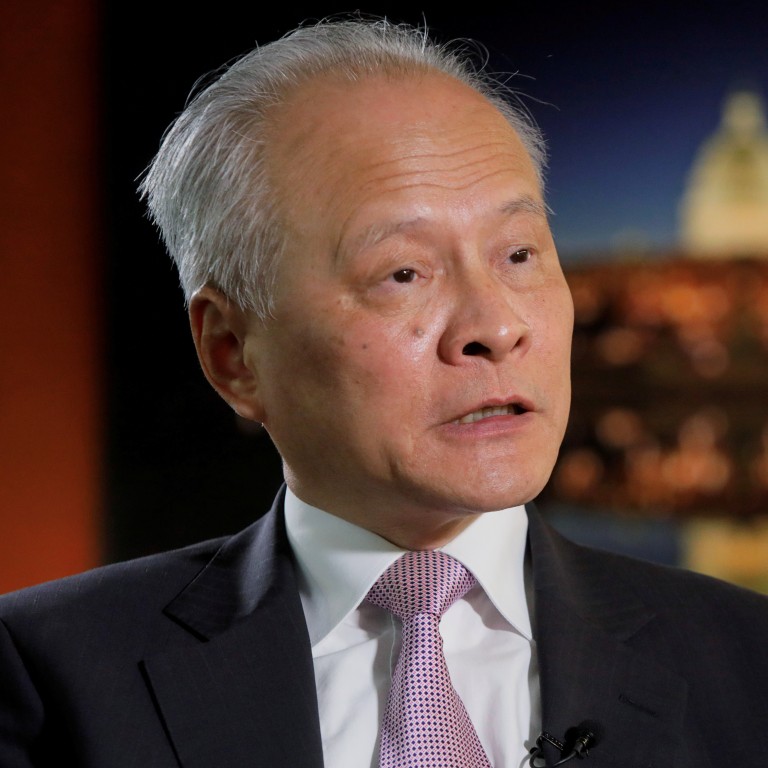
US State Department summons Chinese Ambassador Cui Tiankai amid anger over Beijing coronavirus comments
- Diplomat David Stilwell delivers a ‘stern representation’ of the US government’s position to Cui Tiankai
- Meeting in Washington follows Chinese foreign ministry spokesman’s insinuation that the US military brought the coronavirus to China
The US government summoned Chinese Ambassador Cui Tiankai to the State Department on Friday to protest Beijing’s suggestion that the US military brought the coronavirus to China.
The assistant secretary of state for the Bureau of East Asian and Pacific Affairs, David Stilwell, gave a very “stern representation” of the US government’s position on the matter to Cui, who was “very defensive”, according to a State Department spokesman. “No threats, just frank diplomatic discourse.”
“China is seeking to deflect criticism for its role in starting a global pandemic and not telling the world,” the spokesman said. “Spreading conspiracy theories is dangerous and ridiculous. We wanted to put the government on notice we won’t tolerate it for the good of the Chinese people and the world.”
Amid escalating accusations from officials and politicians in China and the US, Chinese foreign ministry spokesman Zhao Lijian posted a series of tweets late on Thursday and early Friday suggesting that the virus, which causes the potentially deadly illness Covid-19, may have been spread by the United States military.
Zhao’s allegation was apparently linked to the US Army’s participation in the international Military World Games held in Wuhan in October, which drew competitors from more than 100 countries.
Recriminations over which country bears the most responsibility for the Covid-19 pandemic began after reports that whistle-blowing ophthalmologist Li Wenliang was reprimanded by Chinese public security officers for “spreading rumours” about the contagion in an online chat group.
The “rumours” that sparked the backlash from law enforcement officials were lab reports shared by Li suggesting that the new contagion was spreading in his home city of Wuhan, seen as the epicentre of the coronavirus outbreak. Li died on February 6 after contracting the virus.
Last week, US Secretary of State Mike Pompeo referred to the coronavirus on several occasions as the “Wuhan virus”, ignoring pleas from Beijing and world health officials for the public to avoid using names for the disease that could incite xenophobia and racial discrimination.
Cui was caught up in another contretemps involving unfounded accusations last month.
Senator Tom Cotton, a Republican from Arkansas, suggested that the spread of the novel coronavirus might have been an unintended consequence of an alleged Chinese biological warfare programme.
Jack Ma to donate 500,000 virus test kits and 1 million masks to US
When Cui was asked about the claim in a CBS interview and called the speculation “dangerous”, Cotton said that there was a virology lab on Wuhan’s outskirts and that the onus was on the Chinese government to disprove his assertion.
The Wuhan Institute of Virology, which houses China’s only level four biosafety laboratory, the highest-level classification for labs that study the deadliest viruses, is more than 30km (18.6 miles) from the epicentre of the coronavirus outbreak.
Cotton later acknowledged that there was no evidence that the coronavirus originated in the laboratory.
“We don’t have evidence that this disease originated there, but because of China’s duplicity and dishonesty from the beginning, we need to at least ask the question to see what the evidence says,” he said last month.
The scientific community – including infectious disease experts who have evaluated the genetic sequencing of the novel coronavirus – has dismissed the conspiracy theory, saying there is no evidence the virus was engineered.
China’s embassy in Washington did not immediately respond to a query sent to them after regular business hours.
Purchase the China AI Report 2020 brought to you by SCMP Research and enjoy a 20% discount (original price US$400). This 60-page all new intelligence report gives you first-hand insights and analysis into the latest industry developments and intelligence about China AI. Get exclusive access to our webinars for continuous learning, and interact with China AI executives in live Q&A. Offer valid until 31 March 2020.

